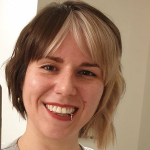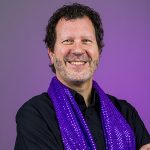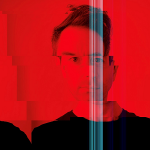Hack the GLAMR
The nexus of creativity, technology and cultural data.
#1 – Stewarding data-rich collections for use and re-use
Data is a fundamental part of what we do in libraries and other GLAMR institutions: we often highlight exciting outcomes created from our data and we love when this is something unique and impactful for others to use. Despite this, GLAMR institutions occupy an interesting space in Open Data movements, more as intermediaries or stewards of data-rich collections. We need to lead by example to uncover data in our collections in creative ways and to make our data more usable, structured and open for people and machines. Ultimately, we aim to empower users to create connected, rich digital experiences from our diverse collections and content.
 Speaker: Rachel Merrick, State Library Queensland
Speaker: Rachel Merrick, State Library Queensland
Rachel Merrick is Coordinator of Digital Library Initiatives at State Library of Queensland. She helps the State Library deliver innovative digital services for an evolving online environment. This includes the release of structured open data for use by developers, creative artists, researchers, and library staff. Rachel encourages GLAMR institutions to harness their data-rich digital collections of photographs, maps, manuscripts, videos, and more for re-use in computational environments.
#2 – Two problems: using regular expressions
Jamie Zawinski famously quipped, ‘Some people, when confronted with a problem, think “I know, I’ll use regular expressions”. Now they have two problems.’ It’s true that regular expressions can be difficult to get right but they carry much potential in a huge variety of applications. Programmers can use them in languages such as perl, python, PHP, javascript – even Visual Basic; librarians can use them in MARCEdit and OpenRefine and everybody can use them in Notepad++, EditPadPro, and UltraEdit. Regular expressions are powerful tools for searching, validating, and manipulating data.

Speaker: Alan Manifold, State Library Victoria
Alan Manifold enjoys anything that gives him a chance to exercise creativity. That could be singing in a choir, composing a song, creating a PowerPoint presentation, developing a computer program, crafting a business letter, writing a novel (check out Consulting Detective!), producing a virtual choir video, or fashioning a regular expression.
#3 – The open source technology behind ACMI’s new visitor-focused experience
ACMI closed its doors in 2019 to shape a more visitor-focused, new permanent exhibition, The Story of the Moving Image. In this exhibition, there are a lot of moving image and objects on display which can be overwhelming to some audiences. This is why ACMI built a system called The Lens. Every visitor picks up a Lens, which they use to collect objects and media to watch and explore in their own time. The Lens is backed by a complex suite of technology, a fleet of devices, management tools and XOS, ACMI’s eXperience Operating System.
 Speaker: Simon Loffler, ACMI
Speaker: Simon Loffler, ACMI
Simon Loffler is a creative technologist at ACMI, Australia’s national museum of screen culture in Melbourne. He is also a software developer at New Internationalist. He previously helped restart Hackerspace Adelaide, co-founded MOD. museum of discovery, and loves using and contributing to open source software projects.
_________________________________________________________________________________________________________________________
Registration Policy
TechEx Sessions are separately ticketed and numbers are limited. A waitlist applies.
Registering is a commitment to attend. If you are unable to attend, please advise the VALA Secretariat as soon as possible to allow a waitlisted person to attend.
Transfer
Transfer of registration can be requested by email to the VALA Secretariat (kim@vala.org.au); there is no processing fee for transfers.

